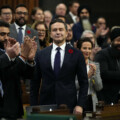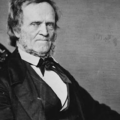At an April rally last year, while he was still battling to be the leader of the Conservative Party, Pierre Poilievre slapped his thigh along with the hard syllables of the most popular chant among the event’s attendees.
“De-fund the C-B-C. De-fund the C-B-C. De-fund the C-B-C.”
As the crowd chants, Poilievre scans the room and points to the immediate left of the cameraman. A cynic, or a political veteran, might describe it as a suspiciously-placed cameraman, but on YouTube, where the video has more than 65,000 views, it mostly looks like an organic moment of crowd interaction.
“Oh my goodness, look at that, we’ve got a sign!”
The camera pans to a boy holding a well-made sign with the CBC logo and the slogan of the night: “DEFUND The CBC.”
Poilievre beckons the boy to the centre of the room and, after a moment of hesitation and some cajoling from people around him, the boy sprints toward the soon-to-be Conservative leader and proudly shows off his sign.
“Ladies and gentlemen, I think we have another future prime minister here.”
The crowd roars, the boy gets a high five from Poilievre and the rally continues.
Like almost every other major rally during Poilievre’s leadership campaign, the “defund the CBC” chant and the roars of approval when Poilievre vows to slash the corporation’s funding will be the high point, an orgiastic crescendo that blows the roof off the place.
If any rockstar worth their salt knows the line “It’s great to be back in Edmonton!” will be an easy way to pump up some enthusiasm, Poilievre similarly knows that slashing the CBC’s budget is his ace-in-the-hole.
The first question on the minds of Canadians, and especially those who chanted enthusiastically at these rallies, is whether Poilievre means what he says.
There’s good reason to be suspicious because this promise has been made before.
In 2020, Erin O’Toole pledged to defund the CBC, but the plan was so badly watered down by the time the federal election came along that anyone committed to truly changing or eliminating the CBC would have been sorely let down.
“I’ll slash funding for English TV and CBC News Network, and end funding for digital news. Focus should be on CBC Radio and Radio Canada,” O’Toole tweeted on Feb. 14, 2020, when he was in the thick of a leadership race and portraying himself as the “True Blue” candidate.
O’Toole’s said his goal was to make CBC English television private within his first term, but the following year’s Conservative platform only promised a simple mandate review. Needless to say, there have been no enthusiastic chants about mandate reviews at Conservative rallies.
With Poilievre running more credibly as the candidate of the Conservative base, and seeming to genuinely believe many of the things he says on the campaign trail, many Conservatives and political observers are expecting him to hold the line on his promise.
“He’s made this more central and it’s more core to his identity than I think it was for O’Toole,” said Aaron Wudrick, who is the director of the domestic policy program at the Macdonald-Laurier Institute. “I think Poilievre’s natural inclination is to do something dramatic to the CBC.”
If Poilievre plans to include a substantial “defund the CBC” policy in his party’s platform two major questions remain: will it be popular and what will the policy actually look like?
The questions are endlessly entangled because public opinion will likely shift with a more or less drastic plan to cut the CBC’s funding.
Canadians are split on the general question, although more people support defunding the CBC than oppose it. A Mainstreet Research poll conducted last year found that 31 percent of Canadians strongly supported defunding the CBC, while 15 percent of Canadians said they “somewhat support” the idea. On the other side, 24 percent of Canadians strongly oppose defunding the CBC, while 13 percent somewhat oppose it. The Mainstreet poll surveyed 1,088 Canadian last September and carries a margin of error of three percentage points, 95 percent of the time.
Notably, Canadians are more likely to feel strongly, in either direction, than to equivocate. If it becomes a major issue in a general election, it’s bound to be an emotional and polarizing debate.
The remaining question is what the energetic chants about defunding the CBC look like once they’ve been transformed into public policy.
In November, Catherine Tait, the president and CEO of CBC/Radio-Canada, directly addressed the movement to defund her organization and argued that people aren’t aware of the good the CBC does.
“Many of you will have no doubt heard the calls by some to ‘defund the CBC.’ I’m not sure those who chant the slogan really know what it would mean. I believe it’s important that everyone understand what is at stake,” said Tait, in a speech at the International Institute of Communications’ annual conference.
Tait listed the services that would be lost without the CBC, including francophone broadcasts in English communities, local news in Prince Edward Island, and vital communications services in Canada’s North.
It’s a crowd-pleasing list that hews closely to the narrowest definition of the CBC’s mandate. If Poilievre were to use Tait’s list of vital CBC services and defund the rest, he might easily be able to remove a billion dollars from the corporation’s nearly $1.4 billion slice of government funding.
The phrase “defund the CBC” could mean many things, though, and Poilievre will have lots of options at his disposal.
The most drastic move would be to privatize the entire operation, similar to how the previous Conservative government sold off the Canadian Wheat Board.
“My preference is just to sell it— either as a whole or in pieces—to the highest bidder. Whatever gets the highest price,” said Matthew Lau, an adjunct scholar at the Fraser Institute
“My view is that things like broadcasting should be handled by the private market. No different than, say, cars,” said Lau.
Lau said a truly free market plan for the future of the CBC would be no plan at all. The market would decide what the media and broadcasting landscape should look like and it would adjust accordingly.
It’s unlikely that Poilievre would go that far and, at the very least, Radio-Canada, the French language side of the CBC, will likely be safe. If the Conservatives were keen to sell off most of the English side of the CBC, it could also re-purpose the programming side of it to create Canadian content that could be dispersed to private networks.
“One (option) would just be to funnel all public funding through Telefilm, to fund programs, rather than networks, on the principle that we want to see ‘Canadian stories’ (I don’t, but supposing I did) at any point on the dial, not just on the CBC,” wrote Andrew Coyne, more than a decade ago in Maclean’s.
Another option, that would likely satisfy many of the media outlets that compete with the CBC, would be to ban it from running advertising.
This would have the dual effect of pushing the CBC back toward public service issues, rather than building mass markets for advertisers, and also taking it out of the highly competitive market for ad dollars that private media companies need to survive.

“They’re trying to build audiences that are attractive to advertisers, such as around the Greater Toronto Area,” said Peter Menzies, former vice chair of the CRTC. With the CBC focused on big markets, it naturally pulls the corporation’s focus away from Canada’s North and the small communities it was originally created to serve.
This plan wouldn’t defund the CBC, but it would slice a big chunk of money from its budget. The CBC was projected to pull in $650 million in revenue in 2022, much of which is advertising dollars.
Menzies said he expects that the public will rally behind the CBC if an election campaign started to become a fierce, existential debate about the future of the corporation.
When the issue goes beyond hypothetical polling questions and into the real world, Menzies said he expects only hardcore Conservatives will be excited by it.
“Conservatives hate the CBC. And they hate it because it’s prejudicial towards them,” said Menzies. Everyone else will either be on the fence or strongly supporting the CBC, giving Poilievre an issue that rallies his base but doesn’t help him win new seats in pursuit of a majority government.
Poilievre could also decide that the CBC should be directly funded by the people who actually watch it.
Over the years, Globe and Mail columnist Andrew Coyne has proposed other alternatives to a fully-funded public broadcaster, including transitioning it to a subscription service, which he argues is “the very least” that should be done. In the U.K., the British Broadcasting Corporation has already admitted that it might have to shift to subscriptions and away from the mandated license fees it survives on now.
The crucial paradox at the heart of the CBC has been that it seeks to offer mandate-driven programming that the market can’t provide, while simultaneously trying to appeal to a mass audience to boost advertising revenue.
Now, the internet has made a subscriber model, which could charge viewers directly for the programs they watch, technically straightforward. The web has also brought video and audio streaming to remote and rural areas in a way that might have been only possible for a public broadcaster in the past.
“Perhaps there are some purely public services (the CBC) performs that its viewers should not be asked to fund. But generally speaking there is no longer any public good case for public funding: that is for making everyone else pay so that the CBC’s supporters don’t have to,” wrote Coyne.
Recommended for You

‘Focus on the fundamentals’: Calgary Mayor Jeromy Farkas on how government can work again

Love, loss, and the sweet pain of sports suffering

How Poilievre’s Conservatives can win the next election

Pierre Poilievre secured a resounding win—here’s why: The Weekly Wrap



